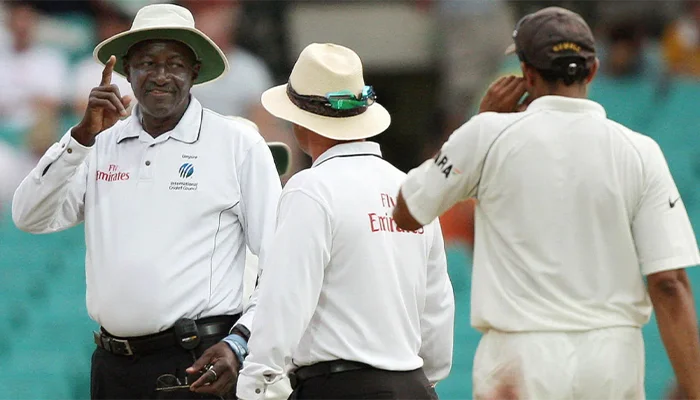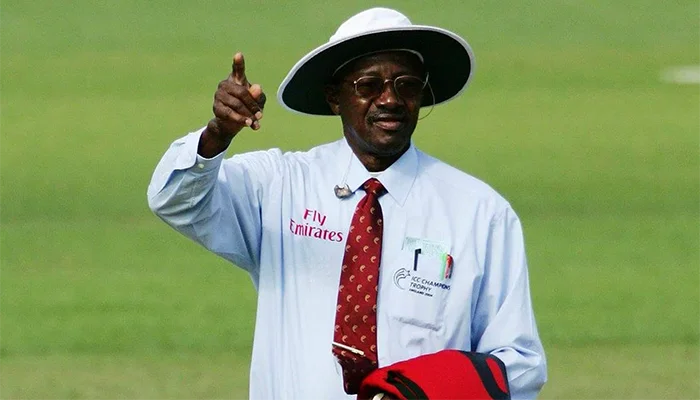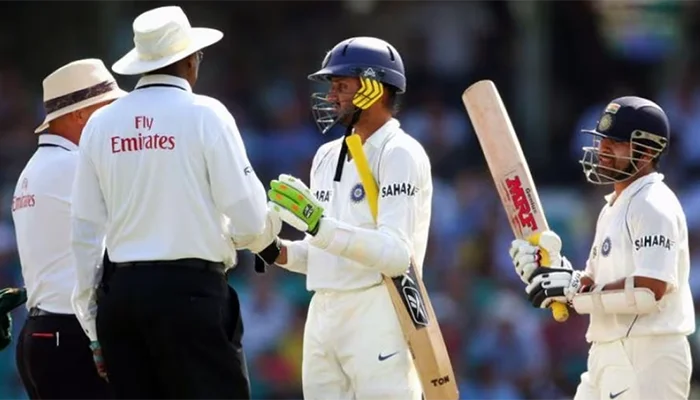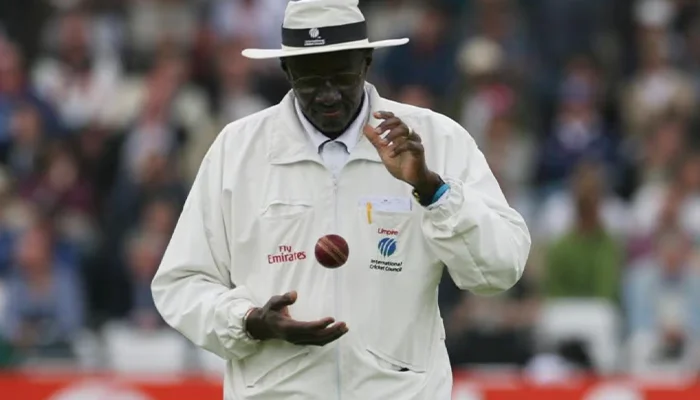Controversial Call: Steve Bucknor's Removal from Umpiring Duties

(Steve Bucknor umpiring in the famous 2008 Border-Gavaskar Trophy)
Umpiring has been a crucial aspect of cricket matches, even after a lot of developments in technology. Although the players can now check on the umpire’s decision these days with the help of DRS technologies like Ultra Edge System, LBW Check, and many others, but during the old times of the game, the umpire's decision was the final decision of the game. Due to this reason, the umpires play an important role in cricket matches, as they have to be attentive to the game and prevent making false decisions, as it affects the match to a great extent.
But not all umpires fairly use this. Steve Bucknor was also one of them, as he has been more popular among cricket fans for his unfair decisions in cricket matches. Bucknor even gave unfair dismissals to the iconic Sachin Tendulkar many times, which affected the match results to a great extent. During the Test series between India and Australia in the year 2008, Bucknor’s unfair decisions led to India's loss and he was replaced by Billy Bowden in the third Test match.
Previous Controversies
Steve Bucknor had given out to Sachin Tendulkar on two different occasions, which affected the match’s result to a great extent. There were also several times when Steve Bucknor went unmoved when India appealed for the wicket. Although Steve Bucknor had been the umpire in more than 100 International Test matches, he is widely known as the worst umpire in the history of cricket due to various reasons. Bucknor's inconsistent rulings, coupled with instances where he remained unmoved despite India's appeals for wickets, have cemented his legacy as one of the most criticized umpires in cricket history.
During the 2003 Test match between India and Australia, the turning point of Bucknor's career as an umpire started, when he gave an unfair dismissal to Sachin Tendulkar. Tendulkar was performing well when Gillespie bowled a delivery that touched the pads but was missing the stumps. This decision sparked widespread debate and criticism, marking a pivotal moment in Bucknor's tenure as an umpire. After this, Steve Bucknor was also rumoured to be supporting Australia, as his unfair decisions mostly came against India, affecting the match's result.

(Steve Bucknor giving his decision in an International match)
In a Test match between India and Australia, Steve Bucknor accepted his umpiring mistakes after the match but in a cruel way. Bucknor said that he gave unfair decisions in just two days which prevented India from winning the game, and also pointed out that he isn't the only umpire who has given unfair dismissals. This response, while acknowledging fault, lacked the empathy and accountability expected from a seasoned umpire in such circumstances.
Along with that, it also sparked debates among Indian Cricket fans, as Bucknor even raised questions on the Board of Control for Cricket in India (BCCI) during his interview after the match. This incident not only highlighted the contentious nature of his umpiring decisions but also strained the relationship between Bucknor and Indian cricket enthusiasts.
The 2008 Test Match
The 2008 Test match between India and Australia which was being played in Sydney, turned Bucknor's career close to his retirement as an umpire. In the Test match, Bucknor made various unfair decisions throughout the game, which sparked controversies among the cricket fans. Also, these unfair decisions came against India, which also cost India the series matches, and the team lost the series in the end. The fair nature of decisions, repeatedly overlooked by Bucknor, not only profoundly damaged his reputation but severely reinforced the need to reform the game of cricket by emphasizing on a system of accountability and transparency for the umpiring.
The Indian bowlers were performing well in the test match, as Australia went down to 134 runs with the loss of six wickets. However, the 7th wicket partnership went a lot higher, allowing Australia to finish at the score of 463 runs. Andrew Symonds scored 162 runs in that innings, while he wasn't given out by Steve Bucknor when he was at the score of 30. Ishant Sharma bowled a delivery to Symonds which was nicked by his bat and was caught by Mahendra Singh Dhoni. But Steve Bucknor was unmoved which led to Andrew Symonds scoring 162 runs for Australia and also turned the match to a great extent. However, Steve Bucknor's decision to not give Symonds out left India frustrated and allowed the Australian batsman to significantly influence the match's outcome.
But this wasn't the only unfair decision given by Steve Bucknor in that match, as he gave another unfair dismissal to Rahul Dravid when India was chasing the score of 333 runs. Rahul Dravid could have led India to a victory in the intense encounter but was given out by Bucknor when the ball had no contact with the bat. Rahul Dravid was batting at the score of 38 runs off 103 balls when the ball went to the wicket-keeper without having contact with the bat. However, Dravid was given out by Steve Bucknor, costing India another match in the series against Australia. The replays also showcased that there was a clear gap between the bat and the ball, but Bucknor gave the unfair dismissal to Dravid. This second instance of perceived injustice further fueled criticism of Bucknor's umpiring performance and intensified calls for greater accountability and transparency in cricket officiating.

(Harbhajan Singh arguing with the umpires after he was given out wrongly)
Having made both unfair decisions against India, Bucknor was even called an Australian Cricket team supporter due to the dismissals. The unfair dismissal of Rahul Dravid, along with an unfair decision against Andrew Symonds when he was at the score of 30, sparked controversies among cricket fans, not only in India, but all over the world. Finally, the International Cricket Council (ICC) would seem to be very affected by Steve Bucknor, as he was removed from the last Test match and retired the next year. Accusations of bias also led to Bucknor's elections, drawing attention to the significance of umpires in maintaining an unbiased and fair game to keep the game's integrity.
Aftermath
After the unfair decisions made by Steve Bucknor in the Sydney Test, the controversies among the cricket fans also reached the International Cricket Council (ICC). Due to this reason, Steve Bucknor was sacked from umpiring the third Test match between India and Australia, being replaced by Billy Bowden as the umpire. The decision to substitute Bucknor for Bowden by the ICC was a swift reaction to the ballooning disputes concerning his umpiring officiation against India, which indicates a shift in the view of the management towards the questions about the umpiring ability and the integrity of the game worldwide.
Steve Bucknor also took his retirement as an umpire in the year 2009, which came within a year of the sparked controversies due to his unfair decisions. In an interview, Bucknor apologised for his wrong decisions which cost India the Sydney Test match against Australia. Bucknor even said that two wrong decisions could not let people decide his umpiring skills, as he made the right decisions in the remaining five days. This sentiment underscored Bucknor's belief in his capabilities as an umpire, despite the criticism and scrutiny he faced during his career. Although Steve Bucknor was an umpire in various International matches, his umpiring career is still remembered because of the unfair decisions he made on various occasions.
How did the Bucknor case change umpiring in Cricket?
When Steve Bucknor retired as an umpire in the year 2009, the International Cricket Council knew that there could be occasions where the unfair decisions by the umpire could affect the spirit of the game. As a result, the ICC started working on various technologies through which the players could be able to recheck the decisions made by the umpire. Therefore, the Decision Review System was launched during the year 2008, when India and Sri Lanka faced each other in Colombo. The DRS aimed to enhance the accuracy of decision-making by providing players with the opportunity to challenge umpire rulings, thereby promoting fairness and transparency in cricket matches. Till now, the Decision Review System has saved various players from being out unfairly.

(Steve Bucknor umpiring in an International game)
With the introduction of the DRS system, the players can review the decisions made by the umpire, whether it is a caught behind or a Leg Before Wicket. Earlier people used to say that the on-field umpire plays an important role in the game, but now the third umpire has also been an important aspect in cricket matches. The Decision Review System was launched by the ICC but it has some restrictions, giving the team only two DRS per inning. But the DRS remains unused if the decision challenged by the team comes in their favour, allowing the cricket fans and players to enjoy every moment of the game.

Comments
Sign up or log in to your account to leave comments and reactions
0 Comments